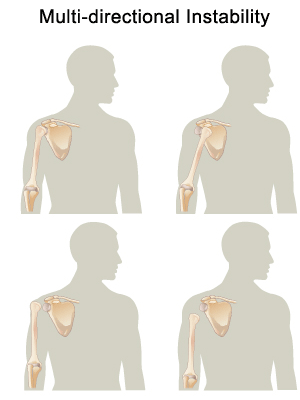Medical Library
Loading...Please Wait

Multidirectional Instability Signs and Symptoms
Signs of ligamentous laxity are present. Pain and weakness are present in the shoulder that subluxes (partially moves out of joint) forward, backward, or downward. A positive “sulcus sign” is present on examination by a medical professional.
Most patients respond well with physical therapy. Rarely surgery is indicated because it is hard to stabilize the shoulder in all directions.
Possible Treatments
- Active Assistive Range of Motion

- Aerobic/Endurance Exercise

- Core Strengthening

- Cryotherapy or Cold Therapy

- Electrotherapeutic Modalities
- Isometric Exercise

- Proprioception Exercises

- Physical Agents
- Shoulder Active Range of Motion

- Shoulder Joint Mobilization

- Shoulder Passive Range of Motion

- Shoulder Resistive Range of Motion

Possible Treatment Goals
- Decrease Risk of Reoccurrence
- Improve Fitness
- Improve Function
- Improve Muscle Strength and Power
- Improve Proprioception
- Self-care of Symptoms
- Improve Safety
- Improve Tolerance for Prolonged Activities
- Improve Wound Healing
Additional Resources
Disclaimer
The information in this medical library is intended for informational and educational purposes only and in no way should be taken to be the provision or practice of occupational therapy, medical, or professional healthcare advice or services. The information should not be considered complete or exhaustive and should not be used for diagnostic or treatment purposes without first consulting with your physical therapist, occupational therapist, physician or other healthcare provider. The owners of this website accept no responsibility for the misuse of information contained within this website.